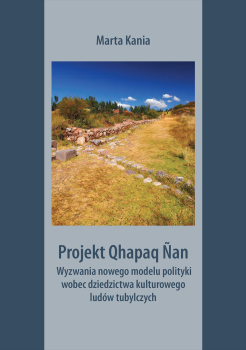Projekt Qhapaq Ñan : wyzwania nowego modelu polityki wobec dziedzictwa kulturowego ludów tubylczych
Keywords:
Peru, Qhapaq Ñan, cultural policy, cultural rights, cultural heritage, indigenous people, political participationSynopsis
The Qhapaq Ñan Project implemented in Peru has therefore served as a focal point for consideration of the ethnic revival of Latin American indigenous communities and for observation of the social and political use (‘politicization’) of the cultural heritage elements in social activities related to democratization processes. The aim of the research was to look at the process of mplementation of the rights of indigenous peoples in the Republic of Peru in the context of the multicultural policy principles adopted by the country at the formal (institutional and legal) level. Also, the aim was to analyze issues such as the right to cultural heritage (mainly archaeological) and the role it can play today in sustainable development prospective. During the research process, I formed the questions: whom does Qhapaq Ñan represent as a symbol of World Cultural Heritage? In whose interest was the entire nomination process and the subsequent UNESCO Declaration? How, on the one hand, the patrimonial process of Qhapaq Ñan, and, on the other, the functionality of the Trail can affect its management plans and protection as a World Heritage site? To what extent is it possible to implement new ethnopolitical standards (consistent with principles of multiculturalism and processes of democratization) leading to the social use of Qhapaq Ñan cultural heritage? How do the processes of patrimonialization and hegemonic up–down relations on the one hand, and the concepts of partitioning, co-management, and the idea of sustainable development on the other affect contemporary relations between representatives of indigenous peoples and public institutions?
Chapters
-
TABLE OF CONTENTS
-
1. Wprowadzenie .......... 21
-
2. Qhapaq Ñan .......... 71
-
3. W kierunku nowej polityki kulturowej .......... 117
-
4. Nowy model polityki kulturowej Peru: od monumentalizacji do partycypacji .......... 141
-
Zakończenie .......... 171
-
Bibliografia .......... 176
Downloads
References





